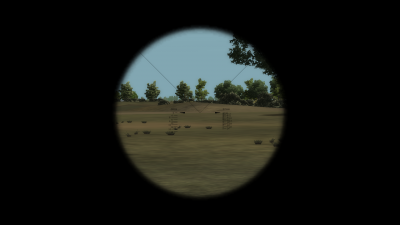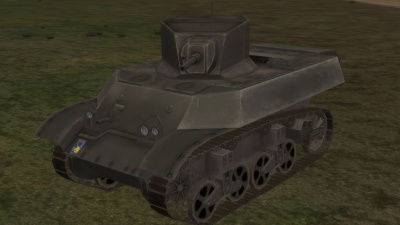Difference between revisions of "M3 Stuart"
| (2 intermediate revisions by the same user not shown) | |||
| Line 27: | Line 27: | ||
| colspan="2" style="text-align: center;" | Specifications | | colspan="2" style="text-align: center;" | Specifications | ||
|- style="background: white;" | |- style="background: white;" | ||
| '''Designation''' || | | '''Designation''' || M40 | ||
|- style="background:#f0f0f0;" | |- style="background:#f0f0f0;" | ||
| '''Magnification''' || | | '''Magnification''' || x1.9 | ||
|- style="background: white;" | |- style="background: white;" | ||
| '''Field of View''' || | | '''Field of View''' || 11° | ||
|} | |} | ||
Latest revision as of 09:44, 30 November 2020
M3A3 Stuart
History

| |
| Main Gun Optics | |
| Specifications | |
| Designation | M40 |
| Magnification | x1.9 |
| Field of View | 11° |
The Light Tank M3 series, called the Stuart, was fast both on and off road, and carried the best 37mm anti-tank gun of the war, which combined small caliber with an extremely high muzzle velocity to produce an effective result. The M3A3 variants and the later M5A1 Stuarts were lend-leased to the Free French, and performed well as long they weren’t expected to engage the heavier German tanks at stand off positions. As the war progressed, the Stuart's small turret ring prevented the upgrades to a bigger gun that it needed to take on the newer, heavier enemy armor that was becoming commonplace.
Where numbers of these fast little tanks could be amassed, a popular tactic resembled an old-style cavalry charge. With speed and sheer audacity, a company of Stuarts would race straight through the parked ranks of heavier enemy armor and fire their high-powered small guns at close range, gaining penetrations from the sides and rear they could not have made in ranged combat. The Stuarts would disappear before before the enemy could properly range their own guns.
Game Play
One word defines the Stuart experience, after weeks of slow French tanks in Battleground Europe: speed. This thing is very fast, with good turret rotation speed and a powerful gun for such a small caliber. The tank acts like and can be used like an armored car. Engage and move, and when you move, move in cover and behind crest-lines to deny the enemy the long shots they will take, knowing your armour is thin. That is why this tank is so fast, because it is lightly armored. Don’t mistake the Stuart for a main battle tank; it certainly isn’t one, but it is an excellent tank for sweeping around the edges of the enemy territory, picking off targets of opportunity that you can surprise with a little caution and a lot of guts. Once in a while, you can even get away with a dash up close but never stop moving and firing or you will get caught and killed quickly.
Its best role is that of a scouting tank that can really pack a wallop up close.
The driver position in this tank has no view slit, you must either use the periscope (numpad “.” or “Del” key) or unbutton with the “O” key, which will pop your driver's head above the top hull plate into the open air. Crew position 4 is the radioman and has a hull .30cal LMG with gunsight. This position can also unbutton, which also pops the crew member's head through the top hull plate hatch.
If you can develop that fine balance of caution, fast flanking, and cavalry charge/shoot/disappear style of combat that favors this little honey, you’ll probably do very well in it. If you can’t, then you probably won’t.
The Stuart is available from tier 1.
